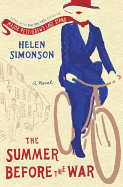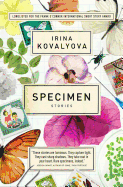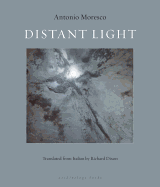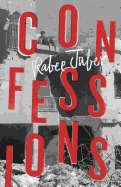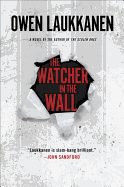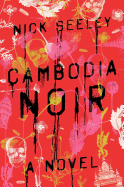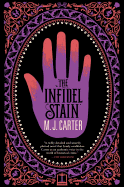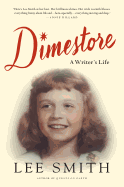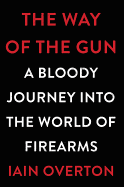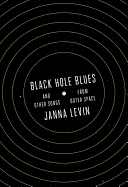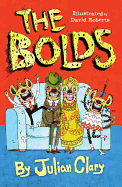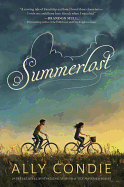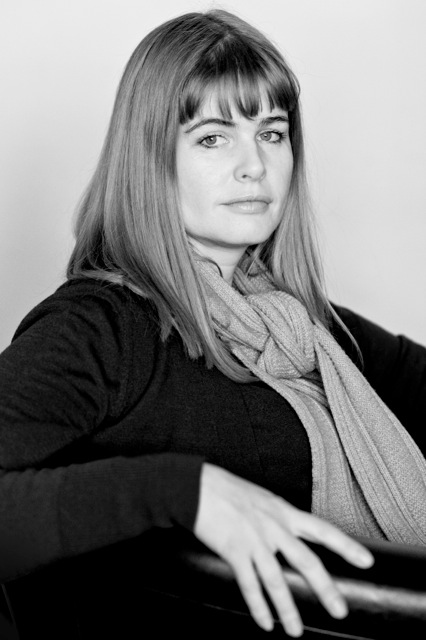 |
| photo: Roderick Field |
M.J. Carter lives with her partner and two sons in London, about five miles from where she was born. After spending many years working for newspapers and writing lengthy nonfiction books (Anthony Blunt: His Lives; The Three Emperors), in 2010 she turned to fiction, beginning with the Blake and Avery series, set in the early years of Victoria's reign. The first was The Strangler Vine, and the second, The Infidel Stain (reviewed below), has just been published by Putnam.
Your Blake and Avery series is set during a transitional time in English history, as the railroad and the telegraph connected the world more quickly. What made you choose this era for your series of detective novels?
I think transitional periods are intrinsically compelling--there's an inherent friction as one period gives way to another. Some are left behind, some find it hard to adapt, and the new is both exciting and full of unforeseen consequences.
I find the first 13 years of Queen Victoria's reign (1837-1850) particularly fascinating. In the space of just a few years, horse and cart gave way to railways; letters to telegraph. London became the biggest city and the biggest trading centre the world had ever seen. There are lots of great things to write about: London journalism and its gutter roots; politics and sex; foreigners in London--from the Irish to Karl Marx; the amazing corruption and bank failures and bubbles of the mid-1840s. And the cultural climate changed too: the rowdier, less polite and socially more easy-going Georgian era gave way to the more prudish, less tolerant, preachy, money-oriented Victorian one. There were winners, and a lot of losers, especially among the poor. People were worried that the world was changing too fast.
I think there are fascinating parallels with the last 15 years, with the Internet and the growth of the global economy.
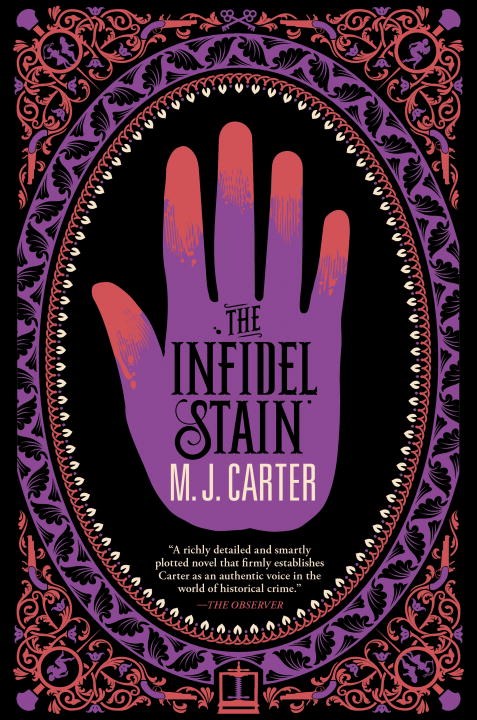 The first book, The Strangler Vine, is set in India, while the second, The Infidel Stain, takes place in London. Why did you move the series? Was the London setting easier to research?
The first book, The Strangler Vine, is set in India, while the second, The Infidel Stain, takes place in London. Why did you move the series? Was the London setting easier to research?
I always knew I wanted to put my detective (or inquiry agent, as he's called) in London and write about Britain in the 1840s. Then I discovered the Thugs and the question of what they really were, and what the British did to them in India, and I really wanted to write about that. So I decided to start Blake off in India, with a sort of origins story. The frontiers of the British empire were places where people from unconventional or lowly backgrounds could find opportunity and reinvent themselves--rather like the American West. Also at this time, the British were just beginning to look upon the people in the countries they occupied as beneath them, but there were still places where the British could encounter different cultures and interact with them. I thought it was a perfect place for Blake to have got himself educated and trained and also to have become alienated from the less appealing parts of British society.
I went [to India] for two weeks with my family--frantically taking notes--read vast tomes, and had a really good time doing it. Then I put all of it into the book. I had to come back to England for the next book because I'd used up everything I knew about India!
As for whether it's easier to write about London, there's a great phrase: "the past is a foreign country"--all writing about the past, wherever you're locating it, involves rendering a time and place you will never be able to see for yourself.
Has the past become such a foreign country that modern London doesn't connect to your novels? Or do you wander the streets to help you with your writing?
I was up by the Strand just last week. I love walking in London and thinking about the layers of history that underlie what I'm looking at. Much of the topography in the bit I write about in The Infidel Stain is still the same, though the Strand is certainly not the glamorous street it was in the high Victorian period, and there's almost nothing left of any buildings from the 1840s, though there are still a few theatres and a couple of publishers. The area where the lowlife Holywell and Wych streets were located was cleared at the beginning of the 19th century and replaced by new streets and a large crescent, but the two churches around it are still there, as is the rather beautiful old Theatre Royal in Drury Lane.
There are many tragic instances of social injustice in The Infidel Stain, and some of them (such as transportation for minor crimes) seem especially appalling to modern sensibilities. Is it important to you to highlight social injustice in your books, or is it a natural byproduct of writing about the era?
I partly want to give readers a sense of what the world was like at that time, in particular what would shock us but was regarded as quite acceptable then. It's easy to romanticize the past, especially this period, which is absolutely what we think of as Dickensian England. I think if you're writing about a period, part of your job is to give a really vivid sense of the sensibilities of the time--it's both interesting and important to know what attitudes we share with that time and what was different. I must admit also that I did want to write about some of the more horrible conditions in which people lived. The books are meant to be implicitly political--but not overstatedly so.
Blake and Avery are an engagingly disparate duo--Avery's upper-class naiveté is a nice foil for the brilliant, curmudgeonly, working-class Blake. Is one of them more fun to write than the other?
Avery comes easier to write, he's so fallible and reminds me a bit of me. Blake is really a fantasy character--cool, silent, brilliant, and therefore harder to make credible and very much not like me. But actually I love writing him more, even though it's a bit harder.
There are tantalizing hints of trouble in Avery's personal life in The Infidel Stain. Can we expect to find out more about his life and marriage in the future?
Ooooh, yes.
Wow, speaking of tantalizing hints! Anything more specific about what you're working on now?
I'm almost at the end of the third Blake and Avery novel, which will be called The Devil's Feast. It is set in London again, but in high-end London, in the gentlemen's clubs of Pall Mall. It's about food and one of the first celebrity chefs, a Frenchman called Alexis Soyer (who features briefly in The Infidel Stain), who really did exist. He was a genius, and having made himself the most famous chef in the London, he organised a soup kitchen to help in the Irish famine. He completely re-organised the provisioning of the British army and invented a portable gas stove that was used by the British army until 1950s.
After that, I'm toying with putting Blake and Avery on one of the new iron ships that Isambard Kingdom Brunel invented for the Atlantic crossing from Britain to the U.S. in the 1840s and maybe sending them to New York. But it's all up in the air right now. --Jessica Howard, blogger at Quirky Bookworm
M.J. Carter: The Past as a Foreign Country
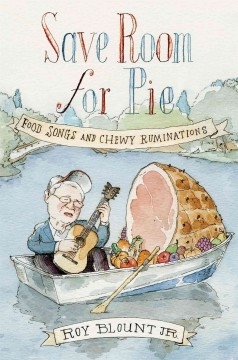 Take his rumination on pie: "Save room for pie. Pie being the highest form of food.... One's room for pie is like one's capacity for love, in this sense: few life-affirming people underestimate their own." His codicil to his rule about eating gravy--"Eat less gravy than you want. Wait--consider this: you can't, possibly, eat as much gravy as you want."--states, "After five potato chips you are just trying to reclaim the glory of the first two--and you know it." Lest you think Blount is all about "bad" food, he likes kale, "And it's healthy, which is fine with me."
Take his rumination on pie: "Save room for pie. Pie being the highest form of food.... One's room for pie is like one's capacity for love, in this sense: few life-affirming people underestimate their own." His codicil to his rule about eating gravy--"Eat less gravy than you want. Wait--consider this: you can't, possibly, eat as much gravy as you want."--states, "After five potato chips you are just trying to reclaim the glory of the first two--and you know it." Lest you think Blount is all about "bad" food, he likes kale, "And it's healthy, which is fine with me."



 The first book, The Strangler Vine, is set in India, while the second, The Infidel Stain, takes place in London. Why did you move the series? Was the London setting easier to research?
The first book, The Strangler Vine, is set in India, while the second, The Infidel Stain, takes place in London. Why did you move the series? Was the London setting easier to research?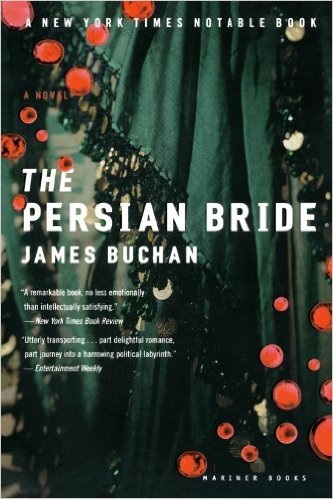 The Persian Bride by John Buchan was published in Britain in 1999 (the TLS reviewer called it the "best novel of the year") and in the U.S. in 2000. The book is something of a memory puzzle as the narrator, John Pitt, recalls with a sort of hallucinatory clarity his trip as a young Englishman to Iran in 1974. He's apolitical, hippie-ish, mostly ignorant of history--which immediately catches hold of him as he falls for Shirin, a 17-year-old schoolgirl, protected child of a wealthy and powerful family, who are also about to be caught up in the churning politics of the time. The two marry in secret and run away, and through Shirin, the beauty and poetry of Iran's past opens up for John (and the reader) even as the corruption and revolution and religious fanaticism of the present overtake the couple, who are violently separated, leaving John to lurch through war and upheaval, in Iran, in Iraq, in Afghanistan, searching for his wife.
The Persian Bride by John Buchan was published in Britain in 1999 (the TLS reviewer called it the "best novel of the year") and in the U.S. in 2000. The book is something of a memory puzzle as the narrator, John Pitt, recalls with a sort of hallucinatory clarity his trip as a young Englishman to Iran in 1974. He's apolitical, hippie-ish, mostly ignorant of history--which immediately catches hold of him as he falls for Shirin, a 17-year-old schoolgirl, protected child of a wealthy and powerful family, who are also about to be caught up in the churning politics of the time. The two marry in secret and run away, and through Shirin, the beauty and poetry of Iran's past opens up for John (and the reader) even as the corruption and revolution and religious fanaticism of the present overtake the couple, who are violently separated, leaving John to lurch through war and upheaval, in Iran, in Iraq, in Afghanistan, searching for his wife.